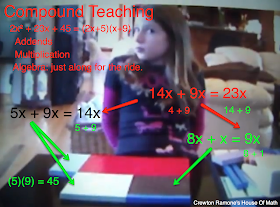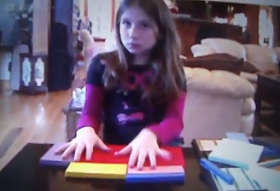Here is another video showing how you use base ten blocks to bring home the basic concepts of addition and multiplication. A very simple concept for very young students to grasp is numbers are made out of other numbers. You need to talk about addends...they get it when you tell them you can make a 5 out of a 3 and a 2. There are 45 addends but rather than doing the same thing over and over again for a whole year, addition in first grade for example, using worksheets and flashcards and drills...why not play and have fun and do many different activities that teach the same thing. Building towers, pyramids, walls and math towns are all activities that teach addends. (Search crewton ramone pyramids or crewton ramone addition) Variety is the spice of life.
 |
| You teach addends, multiplication and the algebra is just along for the ride. |
Here is another slightly more advanced way to teach three things at once using base ten blocks. You teach addends, multiplication and "the algebra is just along for the ride." Before you do this you get very comfortable with ONE x² before you add two or three. And you might check out this page that shows you how to present the basic concepts of addition and subtraction using manipulatives too. While you are using two of them you can really bring home the addends if you have a set of multiple tens. If you only have single blue (or whatever color you have) bars, not so much; BUT you can still get addends done if all you have is single bars just name the groups of x and add those.
As an added bonus you are factoring polynomials. I have discovered that a lot of older students have trouble with algebra because they haven't ever mastered their addends and they don't have their multiplication tables mastered either...yet they passed math several years in a row and find themselves in high school.
I left a few things out of the graphic because it was getting too busy. You should also see 9 + 9 and of course 1 + 1 (the x-squareds) But when counting it up they may do 9 + 1 and 8 + 5 to get 23...at any rate LOTS of math goes on with each problem and the subconscious doesn't miss any of it...
Older students can take the time to draw the problems and write down the symbols. Younger students need speed and repetition so they don't get bored...and taking the time to write it all down slows things down too much...so we just talk about it...this also will come in handy later when you find they can do a lot of math in their heads. No Blocks. No pencil and paper either.
Other comments about this are regarding "mindset". Using algebra to teach basic math works well on all manner of students from various age groups because it changes their minds about math being hard. It's easy and even fun. Once they think it's easy: IT IS. If they think it's hard, math is much more difficult.
The next idea is working with older students who need to master multiplication and all 45 addends using traditional methods can make them feel stupid or inferior because they know they are doing work that is "beneath their level" or that younger kids do...this can be damaging to their self esteem and further turn them off to math. Recently a parent asked me what I thought of the math tutoring a public school had after school..."more math the same way they didn't get the first time. SO lets do it over again and perhaps they will get it this time." Even if they do they will have less than positive associations with math.
If you use algebra and it's fun and easy to start and stays easy, they have fun feel smart because they are doing algebra which they know in kid culture is supposed to be hard AND they get the practice they need to enhance their skill sets in addition and multiplication. Plus playing with base ten blocks is fun--they look like toys. They are toys. Powerful toys that teach math. Toys that make math child's play. In your hands they are powerful tools when used correctly.
They MUST get their hands on the blocks. This way you reach all learning styles and oddly enough several universities have recently made the discovery that the more senses you use the better and easier learning is...and the more learning takes place.
Also note BOTH hands make for a whole brain activity. This is why I have success with so many different students.
The only way to learn math is to do math, have fun while you're at it.
I found early on as a salesman for this method that sales sky rocketed when we had enough kits for everybody in the room and everybody got their hands on the blocks...they understood it, they saw it made it easy they got a kit. Otherwise it was just more math.
Also athletes and other learners that are more kinesthetic excel using this method, and this is also why we do so well with special need learners.
I have made many posts about using algebra to teach basic operations. See the links below. You can also use fractions to teach addends and multiplication but that's another post and another video.
The previous post Algebra With Base Ten Blocks For Addends And Multiplication this could be considered part 1 and the one you are reading now part 2.
More on using algebra to teach other operations:
Using Algebra To Teach Multiplication.
Algebra its many uses.
Here is an older post, contains no video just words and pictures:
Using Algebra To Teach Basic Operations.
And here is a pile of screencasts on various topics:
Crewton Ramone on Screencast-O-Matic.
Use base ten blocks to explain the distributive property.
Shortly there will be another post with Commander Colby showing how to use algebra for remedial math without damaging the child's self esteem or making them feel stupid or like they are behind.



